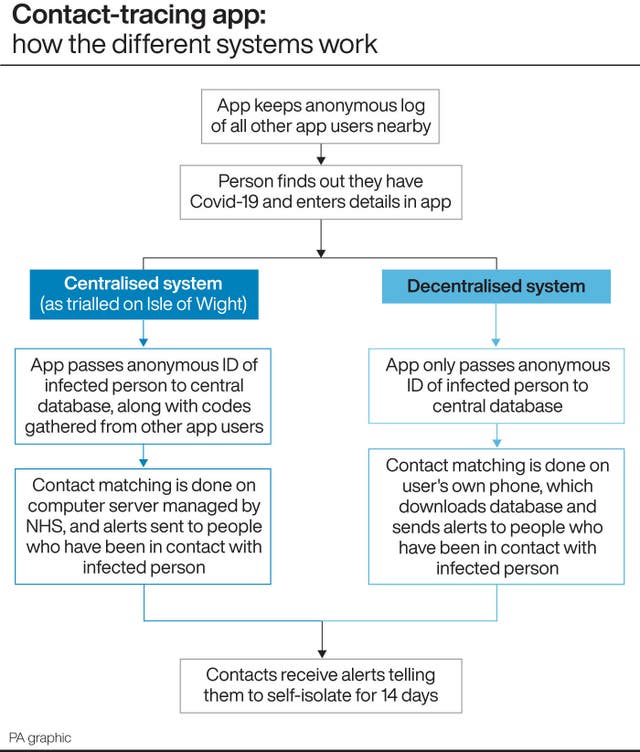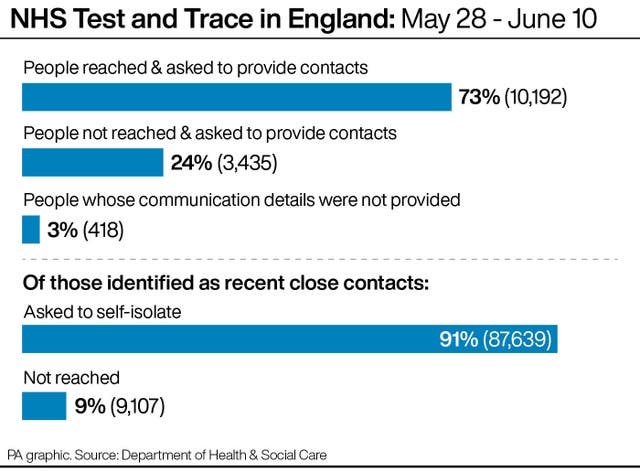Major U-turn as Government ditches attempt to build its own Covid-19 tracing app
Efforts are now to be targeted on developing a programme to support the NHS Test and Trace service based on the Google-Apple model.

The Government is abandoning efforts to develop its own coronavirus contact-tracing app in order to focus on technology from Apple and Google.
In a major U-turn, the Department of Health and Social Care (DHSC) said on Thursday that efforts would be targeted on developing a programme to support the NHS Test and Trace service based on the tech giants’ model.
But no date was being set for the roll-out, despite Health Secretary Matt Hancock having previously said the key app would be available in mid-May.
Labour said the U-turn was “yet another example” of the Government’s response to the crisis being “slow and badly managed”.
Officials said the Government’s app, which was being trialled on the Isle of Wight, was highly inaccurate when used on iPhones, only identifying around 4% of contacts, while the Apple-Google framework recorded 99% of all contacts.
They said they hoped to feed their research into the Apple-Google project, suggesting that the trialled app is superior when dealing with distances between individuals.
Baroness Harding, the executive chair of NHS Test and Trace and Matthew Gould, the chief executive of the NHSX technology wing of the health service, said there had been “specific technical challenges”.
“Our response to this virus has and will continue to be as part of an international effort,” they said in a joint statement.
“That is why as part of a collaborative approach we have agreed to share our own innovative work on estimating distance between app users with Google and Apple, work that we hope will benefit others, while using their solution to address some of the specific technical challenges identified through our rigorous testing.”
Mr Hancock said ministers “remain determined to continue in our ambition” to develop an app that “meets the technical, security and user needs of the public”.
“Countries across the globe have faced challenges in developing an app which gets all of these elements right, but through ongoing international collaboration we hope to learn, improve and find a solution which will strengthen our global response to this virus,” he added.

The tech giants’ design enables more of people’s data to be kept private, which means the Government would have less access to figures on where coronavirus outbreaks are occurring.
But the DHSC said an app would “bring together the functionality required to carry out contact tracing” while enabling people to order tests and access advice.
The development came after figures showed that almost three-quarters of people who test positive for coronavirus and enter the NHS tracking system are now being manually traced.
Some 14,045 people who tested positive for Covid-19 in England had their case transferred to the Test and Trace contact tracing system during the first two weeks of its operation, according to the figures.
Of these, 10,192 people (73%) were reached and asked to provide details of recent contacts.
Some 3,435 (25%) people were not reached and a further 418 (3%) did not provide contact details.
An app to aid those tracing the contacts of people who test positive for Covid-19 has been seen as a key part of preventing a second wave of infections and deaths.
Officials acknowledged that significant issues remain with the Apple-Google technology but they hope it will be ready by the autumn-winter flu season, a crucial point when many could exhibit coronavirus-like symptoms even if they do not have the disease.

It is understood that field tests on the tech giants’ model began on May 6 in parallel to the Isle of Wight trial.
Labour’s shadow health secretary Jonathan Ashworth said: “This is unsurprising and yet another example of where the Government’s response has been slow and badly managed. It’s meant precious time and money wasted.
“Ministers must now urgently prioritise building a fully effective test, trace and isolate regime lead by local expertise to break the chains of transmission of this deadly virus.”
It came as Dr Hans Kluge, European regional director of the World Health Organisation (WHO), said contact tracing and quarantining people potentially infected with Covid-19 was “an essential element” of the strategy to tackle coronavirus.
Meanwhile, a group of independent experts formed to monitor the Government’s coronavirus response has called on ministers to reveal the scientific basis behind the Covid-19 Test and Trace system.
A new report from the Independent Sage body said that lives are at risk from a system that “will not work”.
The group also insisted that it was “impossible” to realise the goal of reaching 80% of contacts under the Government’s plan, which contains “critical failures”.
In other developments:
– The Bank of England left interest rates unchanged at 0.1%. It expanded its quantitative easing programme to boost the economy by another £100 billion to £745 billion.
– The Blackpool Illuminations will stay lit for an extra two months to boost tourism trade hit by the Covid-19 pandemic, now running until January 3.
– London Mayor Sadiq Khan has written to Prime Minister Boris Johnson urging him to make it mandatory for shoppers to wear face coverings.
– First Minister Nicola Sturgeon announced an easing of lockdown restrictions in Scotland, with people who live on their own or only with children under 18 able to form an “extended household group” from Friday.
– Schools in England are set to be given funding to hire private tutors from approved agencies to help pupils catch up, according to The Guardian.





